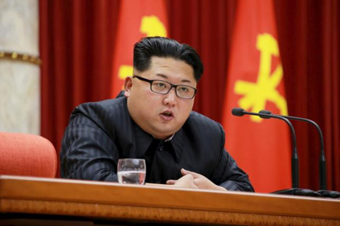
Image courtesy of Voice of America
World Outrage Over
North Korea Nuke Test
| published September 10, 2016 |
By Thursday Review staff writers
Dozens of world leaders and scores of governments are condemning North Korea for its testing this week of a nuclear device, the second such test by Pyongyang in five months. The 10-megaton detonation sent tremors equivalent to a 5.1 earthquake roiling out for hundreds of miles, and scientific and geological measuring facilities as far away as Japan, Taiwan, the Philippines and China registered the shockwaves from the underground explosion.
The nuclear blast came just days after North Korea test-launched three ballistic missiles from its east coast launch facility—medium-range missiles which were fired toward Japan but landed on target somewhere in the waters between the Korean peninsula and Japan.
A variety of international rules and United Nations prohibitions meant to limit or ban nuclear testing are in place, and North Korea has been under heavy U.S. and U.N. sanctions for years. Nevertheless, North Korean supreme leader, Kim Jong-un, has been fast-tracking Pyongyang’s advanced weapons systems and nuclear programs despite threats from scores of countries to ratchet up pressure with even more sanctions against the isolated country.
North Korean media announced that the test was successful, and says that it brings the country one step closer to being able to mount a nuclear warhead atop one of its ballistic missiles. Security and military analysts now conclude that judging from the missiles tests earlier in the week and the strongest nuclear detonation yet for Pyongyang, North Korea is moving steadily toward the ability to deliver a warhead using its aggressive rocket and missile program.
In the past, some critics have questioned whether North Korea has the technology to place a nuclear warhead atop a ballistic missile, but the recent combination of tests now indicate to many of those same experts that Pyongyang has greatly accelerated its program, and may now be within one to two years of having the ability to launch a first strike nuclear attack against one of its Asian neighbors—or, possibly, against west coast targets in the United States.
The North Korean test triggered a meeting of the United Nations’ Security Council, which issued a communique condemning the recent tests as provocative and destabilizing, and a clear violation of U.N. resolutions meant to curb North Korea’s aggressive military buildups.
President Barack Obama also issued a strongly worded response to North Korea’s recent tests of missiles and nukes, calling Pyongyang’s actions “unlawful and dangerous.”
“To be clear,” Obama said, “the United States does not, and never will, accept North Korea as a nuclear state.”
Officials in South Korea and Japan say that the blast occurred at about 9 a.m. local time, and was estimated by geological, meteorological and military officials of both countries to have been twice as powerful as a similar test conducted in January of this year.
The United States and South Korea are on the verge of completing a deal in which Seoul will have access to an extremely advanced, rapid response anti-missile air defense system—considered by most weapons experts to be state of the art—in the very near future. Even as the pace quickens for those plans for the deployment of the air defense system, North Korea has complained in strident terms that the deployment of the anti-missile system is an act of war.
North Korea has accelerated all forms of weapons testing during the last 18 months, including rockets and missiles, submarine launched rockets, and conventional bombs. Much of this feverish pace—according to watchers of North Korea—has been the result of Kim Jong-un’s desire to embolden its military, add weight to its frequent military threats against its neighbor to the south, and rally nationalism and public opinion within its borders.
Related Thursday Review articles:
North Korean Missile Test Draws Condemnation; Thursday Review staff; Thursday Review; September 6, 2016.
North Korea Calls US Sanctions Act of War; Keith H. Roberts; Thursday Review; July 17, 2016.
